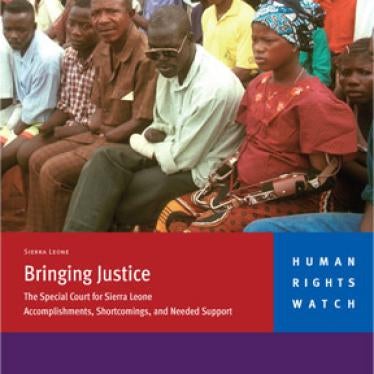(New York) - Member states of the United Nations should pledge more funds to support the Special Court for Sierra Leone.
In a July 23 letter to the U.N. Secretary-General, the U.N. Security Council approved plans to move forward with the court, which will prosecute people accused of crimes against humanity and war crimes in the Sierra Leone conflict over the last five years.
“It’s time for governments to pull out their checkbooks,” said Peter Takirambudde, Executive Director of the Africa division of Human Rights Watch. “The Secretary-General and the Security Council have taken an important step to get this court off the ground. But it’s essential that more states pledge funds to give the court a solid footing.”
Human Rights Watch urged permanent members of the Security Council that have not yet committed funds to do so without delay.
The Secretary-General has stated that as of July 6, 2001, states had pledged $15 million for the court’s first year of operation, and $20.4 million for the next two years. Under the current budget for the court, $16.8 million is required for the first year and $40 million for the next two years.
These budget requirements have already been scaled back from the U.N. Secretariat's initial budget proposal of $114 million for three years of operations.
The court, which will be created by an agreement between the United Nations and Sierra Leone, will have mixed national and international components. It will be based in Freetown, Sierra Leone, and will have both international and Sierra Leonean judges, prosecutors and staff.
“The failure to establish this court with a sound financial basis would send a terrible message, that the international community is not concerned about justice for Sierra Leone,” said Takirambudde. “Meanwhile, potential defendants have been sitting in detention in Freetown while financing efforts have dragged on.”
The court’s Management Committee should play an important role in scrutinizing the court’s expenditures in a transparent manner, Human Rights Watch said.
In a November 2000 letter to the Security Council, Human Rights Watch stressed that the court, in order to avoid the appearance of selective justice, should prosecute those who bear the greatest responsibility for crimes and not solely members of the rebel Revolutionary United Front.
As of mid-July, Canada, the Czech Republic, Denmark, Germany, Mauritius, the Netherlands, Norway, Sweden, the United Kingdom and the United States were among the states that had pledged monetary contributions.
Human Rights Watch has extensively documented the kinds of crimes that the Special Court for Sierra Leone will be addressing.






